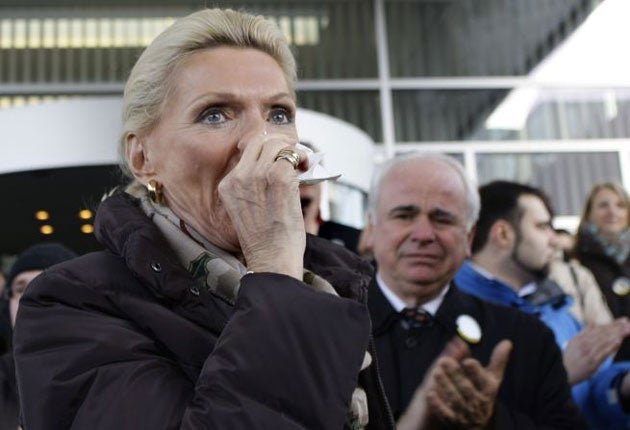German car firm 'used hair from Auschwitz'
Rolls of textiles made by Schaeffler 'contain hair from 40,000 death camp inmates'

Your support helps us to tell the story
From reproductive rights to climate change to Big Tech, The Independent is on the ground when the story is developing. Whether it's investigating the financials of Elon Musk's pro-Trump PAC or producing our latest documentary, 'The A Word', which shines a light on the American women fighting for reproductive rights, we know how important it is to parse out the facts from the messaging.
At such a critical moment in US history, we need reporters on the ground. Your donation allows us to keep sending journalists to speak to both sides of the story.
The Independent is trusted by Americans across the entire political spectrum. And unlike many other quality news outlets, we choose not to lock Americans out of our reporting and analysis with paywalls. We believe quality journalism should be available to everyone, paid for by those who can afford it.
Your support makes all the difference.One of the pillars of German industry, the giant but debt-crippled Schaeffler car parts supplier, was accused yesterday of using hair shorn from at least 40,000 Auschwitz death camp prisoners to make textiles at its factories in Nazi-occupied Poland during the Second World War.
The highly disturbing allegations were contained in new evidence unearthed by Polish historians at the Auschwitz museum, who said they had found rolls of fabric made from camp inmates' hair at a former Schaeffler factory in Poland's southern region of Silesia.
The discovery was the latest in a series of damaging blows for the ailing Schaeffler concern, which employs 200,000 people worldwide. The company is currently saddled with debts totalling €14bn (£12.6bn) and faces the prospect of bankruptcy.
Last month, Maria-Elisabeth Schaeffler, the concern's flamboyant and usually fur-coated millionaire owner, appeared at a trade union rally and wept openly as she appealed to the government of the German Chancellor, Angela Merkel, for a state-funded bailout. In an attempt to clear up rumours about the company's wartime role, Mrs Schaeffler recently admitted to using slave labourers at its factories during the Second World War. However, the company's officially published history still only begins in 1946.
The company's own historian dismissed the allegations yesterday and said there was no evidence to support the theory that Schaeffler processed death camp inmates' hair industrially during the Second World War.
But Dr Jacek Lachendro, a historian at the Auschwitz museum, told Germany's Der Spiegel television channel that 1.95 tonnes of cloth made from inmates' hair had been discovered at a former Schaeffler textile and army tank parts factory in the town of Kiertz (formerly Katscher) after the Germans withdrew at the end of the war.
The amount of cloth, which was pictured on Spiegel television as rolls of closely-woven brownish fabric, was said to have derived from the hair shorn from some 40,000 Auschwitz prisoners. Dr Lachendro said that subsequent analysis of the hair showed that some of it contained traces of the Zyklon B gas used by the Nazis to murder millions in the death camps.
Former workers at the factory in Kiertz who were interviewed on the programme said that they remembered two wagon-loads of human hair being delivered to the company in 1943. Kiertz is three hours' drive away from the Auschwitz camp.
Hair was routinely shorn from prisoners, usually on arrival, at the death camps. The Nazi war machine used it to make army blankets and socks for U-boat crews. The Auschwitz museum on the site of the former death camp displays a store filled to the roof with inmates' hair originally intended for so-called "human recycling".
The Kiertz textile factory where the hair is alleged to have been processed formerly belonged to the Jewish-owned Davistan AG concern on which the Schaeffler empire was founded after it was taken over by the brothers Wilhelm and Georg Schaeffler. Their company made armaments for the Nazi war machine, but after the Second World War it re-emerged as one of Germany's main suppliers of parts to the car industry, specialising in needle roller bearings.
However, the devastating impact of the credit crunch coupled with Schaeffler's misjudged hostile takeover of the tyre giant Continental have since plunged the concern into its worst crisis since the war.
Maria-Elisabeth Schaeffler, an Austrian born former medical student, married into the concern and became its sole owner in 1996 after her husband, Georg, died. Last month she took the unprecedented step of joining a demonstration staged by 800 of her company's employees to appeal for government help. Previously, the company's management style had been called "feudal".
Mrs Merkel's government, which is currently being asked to provide state aid for Germany's ailing Opel car company, has still to decide whether it will help Schaeffler with a bailout.
Join our commenting forum
Join thought-provoking conversations, follow other Independent readers and see their replies
Comments